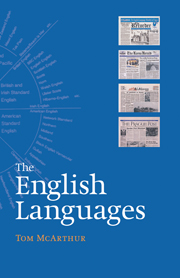7 - Substrates and superstrates
Published online by Cambridge University Press: 12 October 2018
Summary
pid.gin … n [C;U] a language which is a mixture of two or more other languages, esp. as used between people who do not speak each other's language: pidgin English - compare CREOLE, LINGUA FRANCA
cre.ole … n (often cap) 1 [C;U] an American or West Indian language which has grown through a combination of a European language with one or more other languages - compare PIDGIN
(definitions, Della Summers (ed.), Longman Dictionary of English Language and Culture, 1992)Pidgins and creoles: A contentious topic
Although the above definitions are well formed and indicate clearly the links between the two words, present-day pidginists and creolists are unlikely to consider them sufficient. This is not, however, necessarily an adverse judgement on Longman's lexicographers; rather, scholars investigating the pidgin/creole phenomenon tend to have reservations about any definitions of pidgin and creole - including their own - and there are at least four reasons for this:
o The etymology of the terms is problematic, and their current uses among both specialists and the general public are far from uniform, not always precise, and where precise are generally contentious.
o The phenomena which the terms help identify are hundreds - probably thousands - of years old, and may indeed be basic to language itself.
o Although progress has been made in understanding the pidgin/ creole phenomenon, there is as yet no unified theory of the subject and its boundaries are far from clear.
o The varieties of language which the terms cover traditionally have low prestige, and many people (including Speakers of pidgins and creoles) cannot understand why university people should bother with them. The American linguist John A. Holm has made the foUowing comment on this point:
What earlier generations thought of pidgin and creole languages is all too clear from their very names: broken English, bastard Portuguese, nigger French, kombuistaaltje ('cookhouse lingo’), isikula ('coolie language’). This contempt often stemmed in part from the feeling that pidgins and creoles were corruptions of ‘higher’, usually European languages, and in part from attitudes toward the Speakers of such languages, who were often perceived as semi-savages whose partial acquisition of civilized habits was somehow an affront.
- Type
- Chapter
- Information
- The English Languages , pp. 160 - 179Publisher: Cambridge University PressPrint publication year: 1998



